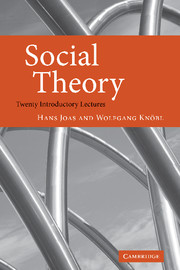Book contents
- Frontmatter
- Dedication
- Contents
- Introduction
- I What is theory?
- II The classical attempt at synthesis: Talcott Parsons
- III Parsons on the road to normativist functionalism
- IV Parsons and the elaboration of normativist functionalism
- V Neo-utilitarianism
- VI Interpretive approaches (1): symbolic interactionism
- VII Interpretive approaches (2): ethnomethodology
- VIII Conflict sociology and conflict theory
- IX Habermas and critical theory
- X Habermas' ‘theory of communicative action’
- XI Niklas Luhmann's radicalization of functionalism
- XII Anthony Giddens' theory of structuration and the new British sociology of power
- XIII The renewal of Parsonianism and modernization theory
- XIV Structuralism and poststructuralism
- XV Between structuralism and theory of practice: The cultural sociology of Pierre Bourdieu
- XVI French anti-structuralists (Cornelius Castoriadis, Alain Touraine and Paul Ricoeur)
- XVII Feminist social theories
- XVIII A crisis of modernity? New diagnoses (Ulrich Beck, Zygmunt Bauman, Robert Bellah, and the debate between liberals and communitarians)
- XIX Neo-pragmatism
- XX How things stand
- References
- Author index
- Subject index
XVII - Feminist social theories
Published online by Cambridge University Press: 05 June 2014
- Frontmatter
- Dedication
- Contents
- Introduction
- I What is theory?
- II The classical attempt at synthesis: Talcott Parsons
- III Parsons on the road to normativist functionalism
- IV Parsons and the elaboration of normativist functionalism
- V Neo-utilitarianism
- VI Interpretive approaches (1): symbolic interactionism
- VII Interpretive approaches (2): ethnomethodology
- VIII Conflict sociology and conflict theory
- IX Habermas and critical theory
- X Habermas' ‘theory of communicative action’
- XI Niklas Luhmann's radicalization of functionalism
- XII Anthony Giddens' theory of structuration and the new British sociology of power
- XIII The renewal of Parsonianism and modernization theory
- XIV Structuralism and poststructuralism
- XV Between structuralism and theory of practice: The cultural sociology of Pierre Bourdieu
- XVI French anti-structuralists (Cornelius Castoriadis, Alain Touraine and Paul Ricoeur)
- XVII Feminist social theories
- XVIII A crisis of modernity? New diagnoses (Ulrich Beck, Zygmunt Bauman, Robert Bellah, and the debate between liberals and communitarians)
- XIX Neo-pragmatism
- XX How things stand
- References
- Author index
- Subject index
Summary
We refer in the title of this lecture to feminist social theories, the plural indicating that we are confronted with a fundamental problem in seeking to describe this field – namely the fact that there is no such thing as feminist social theory, but at best a variety of such theories. The theoretical landscape within feminism is so tremendously multifarious because feminist theorists, whose concrete goals and projects do not, of course, always tally, draw on very different theoretical building blocks to construct their arguments. You have encountered the vast majority of these theories in the previous lectures. While few feminists build directly on Parsonian ideas, a large number make use of conflict theoretical arguments, for example. And the strongest and most influential currents within the feminist debate at present can be traced back to ethnomethodological, poststructuralist and Habermasian positions. In addition, the strong influence of psychoanalysis is also unmistakable.
The question thus arises as to whether this heterogeneous theoretical field of feminism features any kind of common denominator, especially given that feminist debates are being carried on not just within sociology, but also in psychology, anthropology, history, philosophy and political theory; here, disciplinary boundaries play a rather minor role (see for example Will Kymlicka, Contemporary Political Philosophy: An Introduction, pp. 238ff.).
- Type
- Chapter
- Information
- Social TheoryTwenty Introductory Lectures, pp. 432 - 462Publisher: Cambridge University PressPrint publication year: 2009



